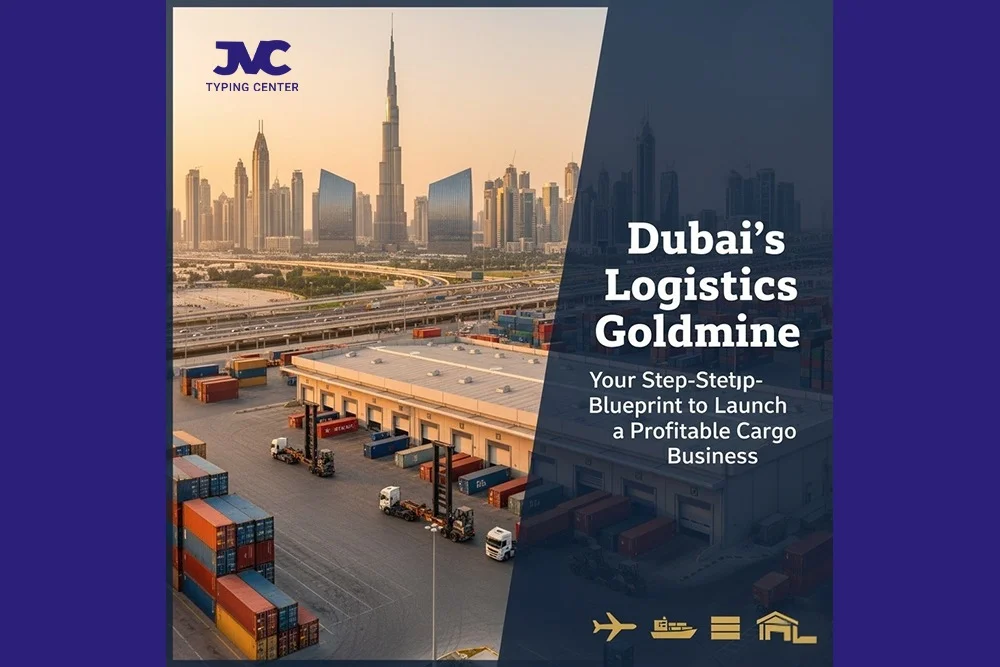
Dubai has become a true powerhouse in global trade. Every year, millions of tons of goods move through its ports and airports, connecting markets across Asia, Africa and Europe. The city’s unmatched location and modern infrastructure make it the first choice for businesses looking to build a cargo business in Dubai.
Dubai is home to some of the busiest logistics hubs in the world. Jebel Ali Port, Dubai International Airport and Dubai South. These facilities handle everything from small courier parcels to massive freight shipments with incredible efficiency.
Entrepreneurs and investors see Dubai as a land of opportunity. The growing eCommerce industry, government-backed trade initiatives and simplified business setup rules have created a perfect environment for logistics success. Whether it’s freight forwarding, customs clearance or warehousing, starting a cargo business in Dubai can open doors to long-term profit and global partnerships.
If you’re exploring new ventures, you may also check out small business ideas in the UAE to discover other profitable opportunities for entrepreneurs.
Understanding the Cargo and Logistics Market in Dubai
Dubai’s logistics industry stands among the strongest in the world. Its trade network links Asia, Europe and Africa through a system built for speed and reliability. This makes Dubai not just a business center but also a key player in the global supply chain.
A Global Trade Powerhouse
Dubai handles goods worth billions every year. The city ranks high in international logistics performance due to its advanced ports and airports. Jebel Ali Port is one of the largest in the Middle East, while Dubai International Airport is known for its fast cargo handling. Together they move products across continents with unmatched efficiency.
Connecting Three Continents
Few cities can match Dubai’s reach. It serves as the meeting point for trade between Asia, Europe and Africa. Companies based here gain access to hundreds of markets through a single hub. This strategic location keeps the UAE supply chain strong and resilient, even in changing global conditions.
Main Types of Cargo Businesses
There are several ways entrepreneurs can enter the logistics field in Dubai. Each offers unique opportunities for growth and specialization.
- Air Freight Services: Ideal for time-sensitive shipments such as electronics, fashion items and medical goods.
- Sea Freight Operations: Perfect for bulk cargo like machinery, vehicles or construction materials.
- Courier and Last-Mile Delivery: Growing fast with the rise of eCommerce and digital shopping.
- Warehousing and Distribution: Supports both importers and exporters with storage and supply management.
For those who prefer smaller-scale setups, you can read about legal support for freelancers in the UAE to learn how independent professionals manage compliance and contracts efficiently.
Why It Matters for Investors
The Dubai logistics industry continues to expand through smart government policies and trade-free zones. Investors can benefit from tax exemptions, advanced transport infrastructure and easy access to global shipping routes. With the right strategy, starting a cargo business in Dubai can become a long-term asset that grows with the city’s booming economy.

Step 1: Choose the Right Type of Cargo Business
Starting a cargo business in Dubai begins with one important choice, picking the right model. Each type of cargo operation serves a unique purpose. The best option depends on your budget, scale and long-term goals.
Let’s look at the main types of cargo businesses you can start in Dubai:
Freight Forwarding
This is the backbone of international logistics. Freight forwarding companies arrange transportation for goods from one country to another. They work with airlines, shipping lines and trucking firms to move products quickly and safely.
- Ideal for: Medium to large investors
- Focus: Managing air, sea and land shipments
- Benefit: High demand due to Dubai’s role in global trade
Customs Brokerage
Dealing with customs in the UAE can be complex. A customs brokerage company helps importers and exporters clear shipments smoothly through UAE customs. These firms ensure documents are complete and duties are paid correctly.
- Ideal for: Investors familiar with trade regulations
- Focus: Handling documentation and approvals
- Benefit: Essential for businesses that import or export regularly
Warehousing and Distribution
Storage and timely delivery are key parts of logistics. A warehousing company in Dubai provides space to store goods before they move to retailers or customers. Some also offer packaging and inventory management services.
- Ideal for: Medium to large-scale investors
- Focus: Storing, sorting and distributing goods
- Benefit: Long-term contracts and stable income streams
Courier and Delivery Services
The rise of online shopping has created huge demand for courier services. This model focuses on last-mile delivery for eCommerce stores and local businesses.
- Ideal for: Small to medium investors
- Focus: Fast, reliable local deliveries
- Benefit: Quick setup and steady daily operations
Choosing What Fits You
- If you want a low-investment entry, courier and delivery is a good start.
- For scalable operations, freight forwarding or warehousing offers long-term growth.
- Investors aiming for steady contracts and government approvals can explore customs brokerage.
Each path can lead to success when backed by smart planning and strong partnerships. Dubai’s logistics ecosystem welcomes both startups and experienced players looking to expand globally.
Step 2: Choose the Perfect Location for Your Cargo Business
Finding the right location is one of the most important steps when starting a cargo business in Dubai. The area you choose will decide your costs, ownership options and how easily you can move goods across borders. Dubai offers two main choices for setting up; Mainland and Free Zone. Each comes with unique advantages.
Mainland Setup
A mainland business license in Dubai gives you full access to the local UAE market. You can work directly with clients, sign contracts with government bodies and expand across the Emirates.
Key highlights:
- Allows trading inside and outside the UAE
- Requires approval from Dubai’s Department of Economy and Tourism (DET)
- Offers flexibility in services like freight forwarding and customs brokerage
Mainland setups are ideal for logistics companies that want to manage door-to-door deliveries or partner with local transport providers.
Free Zone Setup
Free zones are designed for international trade. They provide 100% foreign ownership and easy customs procedures. The most popular logistics free zones in Dubai include:
- Dubai Logistics City (DLC): Perfect for air and land cargo operations near Al Maktoum Airport
- JAFZA (Jebel Ali Free Zone): Linked directly to Jebel Ali Port for sea freight companies
- DWC Free Zone: Known for modern warehouses and high-speed logistics connectivity
Free zone benefits:
- Full ownership without a UAE partner
- No customs duty for re-exported goods
- Quick setup with minimal paperwork
Free zones are best for businesses handling international cargo movement, warehousing or freight consolidation.
Cost and Flexibility Comparison
- Mainland licenses may involve more government approvals but give more flexibility in local trade.
- Free zone setups often have lower startup costs and are easier to manage for export-heavy businesses.
Selecting the right location depends on your goals. If your target is local distribution, go for the mainland. If you want to manage international freight and logistics, a free zone license is the smarter path. If you plan to hire employees or expand your logistics team, explore HR services in the UAE to manage payroll, recruitment and visa support professionally.
Step 3: Obtain Your Cargo or Logistics License
Getting your cargo or logistics license is one of the most important steps in launching your business in Dubai. The process is simple if you follow it step by step. It ensures that your company is legally ready to handle shipments, customs and trade operations across the UAE and beyond.
Start by Choosing the Right Business Activity
You need to define what kind of logistics services your company will offer.
Some options include:
- Freight forwarding
- Cargo transport and storage
- Customs clearance
- Warehousing and distribution
Each activity has its own requirements. Selecting the correct one ensures your logistics license in Dubai matches your business goals.
Reserve a Trade Name
Pick a name that reflects your business identity. It should follow UAE naming rules. Once approved by the Department of Economic Development (DED) or your chosen Free Zone authority, you can use it for all your legal documents.
Get Initial Approval
This step confirms that the government has no objection to your business setup. It allows you to proceed with location selection and document submission.
Submit Required Documents
Prepare all your paperwork carefully.
You’ll typically need:
- Passport copies of shareholders
- Emirates ID (if available)
- Business plan or activity list
- Tenancy contract or office lease
- Initial approval certificate
Once submitted, your documents are reviewed for compliance and accuracy.
License Cost and Timeline
The cost of a DED business license for logistics usually starts from 12,000 AED depending on the activity and location.
Approval can take five to ten working days, especially if all documents are in order.
Pro Tip
If you want a faster and smoother process, consult a business setup expert. They can handle the paperwork, coordinate with authorities and ensure your cargo company registration in the UAE is completed without delays.
To make this step easier, you can attest your business documents through MOFA before submission. It helps in validating your company paperwork for all government and legal procedures.
Step 4: Set Up Office and Storage Facilities
Starting a cargo business is more than paperwork. You need the right physical setup to keep operations smooth and clients satisfied. Your office and warehouse act as the control center of your logistics company.
Choosing the Right Warehouse
A warehouse is not just a storage area. It is the heart of your supply chain. Look for warehouses that are easy to access and close to main highways or trade zones.
- Top areas for warehouse rental in Dubai include Jebel Ali, Dubai Industrial City and Al Quoz.
- Go for facilities that offer temperature control if you plan to store sensitive goods.
- Check for loading bays, forklifts and security systems to handle cargo safely.
Warehouses that follow Dubai Municipality safety standards help you avoid future compliance issues. Fire alarms, proper ventilation and clear safety signs are all must-haves.
Setting Up the Office
Your logistics office should be near your storage or transport hub. This saves time and keeps communication easy between your team and the warehouse staff.
- Ideal locations are near Dubai Airport Free Zone, JAFZA or Dubai South Logistics District.
- Choose an office with enough space for your operations and client meetings.
- Ensure you have reliable internet and power backup for seamless coordination.
A smart office layout improves workflow. Keep departments like customer service, customs documentation and operations close to each other for better teamwork.
Efficiency and Safety First
An organized workspace boosts productivity and keeps operations smooth.
- Mark pathways clearly inside the warehouse.
- Train your team in safe cargo handling.
- Use proper racks and storage systems to avoid damage.
Efficient cargo storage facilities reduce turnaround time and improve customer satisfaction. Safety and smart planning are not just rules. They are the backbone of a successful logistics business in Dubai.
Step 5: Partner with Customs and Freight Agencies
Starting a cargo business in Dubai means understanding how goods move in and out of the country. One of the smartest steps is to build strong partnerships with certified customs agents and trusted freight forwarding networks. These experts make sure every shipment follows UAE trade laws and avoids unnecessary delays.
Why Customs Agents Matter
Dealing with customs paperwork can be confusing. Licensed agents know every rule and step involved. They help you:
- File accurate import and export declarations
- Avoid penalties for missing or wrong documents
- Speed up clearance at Dubai ports and airports
Having a professional handle Dubai customs procedures ensures your shipments stay compliant and move without issues.
Understanding Clearance and Documentation
Every shipment needs proper clearance before it can enter or leave the UAE. The process usually includes:
- Submitting invoices and packing lists
- Providing certificates of origin
- Getting approvals from Dubai Customs online system
- Paying duties and taxes if required
Working closely with your freight partner keeps the process smooth and transparent from start to finish.
Using Technology to Stay Ahead
Modern cargo operations rely on technology. Using digital cargo tracking tools gives you real-time updates on shipment locations and customs status. It reduces errors and helps manage schedules better.
With the right digital system, you can:
- Monitor cargo across borders
- Store documents safely online
- Track payments and delivery milestones
Integrating technology not only saves time but also builds trust with clients who value clear and timely updates.
Partnering with the right customs and freight agencies is more than just a business step. It’s the backbone of a reliable and efficient cargo business in Dubai that meets global standards.

Step 6: Build Your Team and Operations
A cargo business in Dubai runs smoothly only when you have the right people behind it. Your team is the engine that keeps daily operations fast, safe and reliable. Let’s see how to build a strong logistics workforce that meets UAE standards.
Key Roles to Hire
Every cargo company needs skilled professionals who understand the logistics process.
Here are the essential positions to start with:
- Logistics Manager – oversees routes, shipments and client coordination.
- Customs Officer – handles import and export documentation for UAE customs clearance.
- Warehouse Staff – manages inventory, packaging and loading.
- Drivers – ensure timely delivery of goods across the Emirates.
Each role adds value to your operation and keeps customer satisfaction high.
Employee Visa and Legal Compliance
Every worker in Dubai must have a valid employment visa under UAE labor laws.
When hiring, make sure:
- All contracts are registered under the Ministry of Human Resources and Emiratisation (MOHRE).
- You provide medical insurance and Emirates ID for every staff member.
- Working hours, leaves and safety measures follow legal standards.
Keeping your team compliant protects your business from fines and builds trust with government authorities.
Training and Development
A trained team delivers better results.
Focus on:
- Safety training for handling heavy goods and warehouse operations.
- Documentation accuracy to avoid customs delays.
- Customer service skills to create a professional image for your cargo company.
Regular training sessions also keep your staff updated on new UAE transport laws and cargo handling regulations.
A cargo business in Dubai runs smoothly only with the right workforce. Make sure your hiring process aligns with business Emiratization rules in the UAE to stay compliant with local employment laws and contribute to national workforce goals.
Step 7: Market and Grow Your Cargo Business
Building a cargo company is just the start. Growth happens when people know your services and trust your brand. The UAE market moves fast so staying visible and reliable is key to success.
Build a Strong Online Presence
Customers look for logistics partners online before making a call. Make sure your website is simple to use and mobile-friendly. Add your cargo routes, service areas and delivery options. Share success stories and client reviews to build trust.
- Create SEO-optimized blog posts on cargo marketing in Dubai.
- Use Google Business and maps so clients can find you easily.
- Post regular updates on LinkedIn and Instagram to show your activity and credibility.
Collaborate with Growing Industries
Partnerships drive steady business. Many eCommerce companies and manufacturing firms in the UAE need reliable shipping support. Offer special rates for bulk or long-term contracts. Join trade exhibitions like the Dubai Logistics Exhibition to meet potential clients face-to-face.
Add Value to Stand Out
Customers remember companies that make things easier. Try offering services that others don’t.
- Express delivery for urgent goods.
- Temperature-controlled transport for food and medicine.
- Real-time shipment tracking for full transparency.
A strong marketing plan, trusted partnerships and high-quality service will help your logistics business grow across the UAE. Stay consistent with your brand and make every delivery a promise kept.
Cost Overview and Profit Potential
Starting a cargo business in Dubai is more affordable than many think. The costs vary based on the scale of your operations, the type of trade license and the location of your business. Knowing the expenses upfront helps you plan better and reach profits faster.
Initial Setup Costs
Here’s what you need to begin your logistics journey in Dubai:
- Trade License Fee: Starts from around 12,000 AED depending on the authority.
- Office or Warehouse Rent: Small spaces in free zones start from 20,000 AED per year.
- Visa and Registration Fees: Around 5,000 AED per employee.
- Equipment and Software: Investing in tracking systems or cargo management tools can cost 3,000–10,000 AED.
These costs ensure your business operates legally and efficiently within UAE trade regulations.
Ongoing Expenses
Running a logistics company means regular spending on operations.
- Fuel and Transportation: Fluctuates based on shipment size and distance.
- Staff Salaries: Skilled logistics staff and drivers are key to smooth operations.
- Maintenance and Insurance: Regular upkeep of vehicles and cargo protection is vital.
Keeping these under control helps your business stay profitable in a competitive market.
Profit Margins in Logistics
Profit margins in the UAE logistics sector often range from 10% to 25%. Companies with strong networks and smart systems usually perform even better. Offering specialized services such as cold chain logistics or express delivery can boost profits further.
Smart Ways to Maximize Revenue
You can scale your cargo business faster with the right approach:
- Go Digital: Use smart freight management software to track shipments and reduce delays.
- Build Partnerships: Collaborate with shipping agents and eCommerce platforms for regular shipments.
- Focus on Customer Service: On-time delivery and transparency bring repeat clients.
- Target Niche Markets: Explore high-demand sectors like medical supplies and electronics.
Running a cargo business in Dubai is not just about moving goods. It’s about moving smart. With clear planning and the right strategy, you can turn your logistics investment into a thriving, long-term success story in the UAE.
Common Challenges and How to Overcome Them
Running a cargo business in Dubai brings big rewards yet it also comes with a few hurdles. From customs delays to strong competition staying ahead takes planning and smart systems. Let’s look at the main challenges and how you can solve them effectively.
1. Customs Delays and Documentation Issues
One of the most common problems in the UAE logistics industry is customs clearance delays. Many businesses face slow approvals due to missing paperwork or unclear shipment details.
How to Overcome It:
- Always double-check customs documentation before shipment.
- Use digital systems to track and submit forms.
- Work with an experienced cargo clearance agent in Dubai who understands local regulations.
- Stay updated on customs policies through the Dubai Customs portal.
2. Intense Market Competition
Dubai’s logistics scene is packed with both international and local players. Competing only on price is not enough anymore.
How to Overcome It:
- Focus on fast delivery and real-time tracking.
- Offer value-added services like insurance or storage.
- Build long-term partnerships with trusted transport and warehouse providers.
- Invest in skilled staff who can handle logistics operations smoothly.
3. Compliance and Regulatory Requirements
Every logistics company in Dubai must follow strict government standards. Missing even a small rule can lead to penalties or shipment holds.
How to Overcome It:
- Keep your business licenses and trade permits up to date.
- Follow safety and transport regulations for all cargo types.
- Use digital compliance tools to manage renewals and reporting.
- Partner with consultants who understand logistics laws in the UAE.
4. Need for Digital Automation
Manual systems cause errors and delays. Businesses that still rely on paper processes often lose time and customers.
How to Overcome It:
- Shift to automated platforms for shipment tracking and inventory control.
- Use AI-powered dashboards for route planning and delivery updates.
- Provide transparent updates to clients through mobile apps or email alerts.
5. Supply Chain Management Gaps
A smooth supply chain in Dubai depends on timing and coordination. Small mistakes can cause major delivery setbacks.
How to Overcome It:
- Maintain strong links between suppliers, drivers and clients.
- Plan routes early to avoid congestion at ports.
- Keep backup carriers ready for urgent deliveries.
- Review your performance monthly to spot delays and fix them fast.
Staying efficient in Dubai’s logistics market is all about smart planning and technology. By managing compliance, improving customer trust and embracing automation your cargo business can move ahead of the competition with confidence.
Turn Dubai’s Logistics Potential into Your Success Story
Dubai continues to be the heartbeat of global trade. Its ports connect continents. Its airports link businesses faster than ever. For entrepreneurs the cargo business in Dubai offers a rare mix of profit stability and growth. Whether you aim to handle air freight, marine cargo or land transport, the city gives you the perfect foundation to build a lasting business.
Smart planning makes all the difference. Understanding customs laws, managing costs and staying compliant can save you time and stress. Having the right support ensures every shipment and every document moves smoothly.
If you are ready to start your logistics venture, let professionals handle the formalities while you focus on growth.
Contact JVC Typing Center today for expert help with trade license applications, visa processing and document attestation and move your cargo dream forward with confidence.
FAQs: Everything You Need to Know About Starting a Cargo Business in Dubai
Q1: How much does it cost to start a cargo business in Dubai?
The cost depends on your setup type and business model. On average, starting a cargo or logistics company in Dubai can cost between 15,000 AED to 40,000 AED. The price varies based on trade license type, office space and visa requirements.
Q2: Which Free Zone is best for logistics companies in Dubai?
Top choices include Dubai South Free Zone, Jebel Ali Free Zone (JAFZA) and Dubai Airport Free Zone (DAFZA). These zones are known for their strategic locations and modern facilities that support logistics and cargo operations.
Q3: What documents are required for a cargo license?
You’ll need passport copies, trade name approval, business plan and MOFA-attested documents for smooth licensing.
Q4: Can foreigners own a logistics company in the UAE?
Yes. Foreign investors can now enjoy 100% ownership in many sectors, including logistics. This makes Dubai one of the best places for international entrepreneurs to launch and expand their cargo businesses.
Q5: How long does it take to start a cargo or freight business in Dubai?
With all documents ready, the process usually takes 5 to 10 working days. Choosing the right Free Zone or Mainland setup can make the process faster and smoother.

3 comments on “Dubai’s Logistics Goldmine: Your Step-by-Step Blueprint to Launch a Profitable Cargo Business”